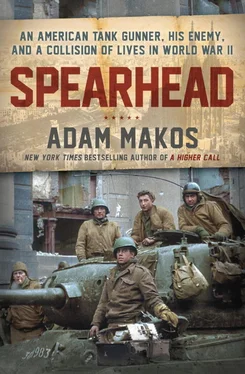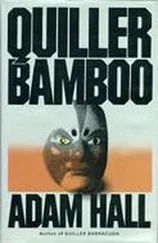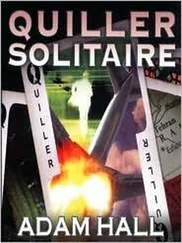But his emotion couldn’t overcome his upbringing. “Always be modest,” his grandmother had taught him, “and always be honest.”
Facing an entirely different kind of fear, Gustav broke the silence. “I lost it… I lost all our precious food!”
The men were furious, as Gustav knew they’d be. “What about our smokes?” one asked.
Gustav retrieved five small cigarette packets from his pockets. Each held four cigarettes and was badly crumpled. Gustav passed the packs through the shells to the other men, which sparked a fresh round of cursing.
Gustav pulled a wooden box from a cloth bag he kept beside his seat. Inside were numerous packets of cigarettes and a bed of cigars. He slipped the crumpled cigarettes inside and returned the box to the bag.
As the crew continued to grumble, the commander reassured them: “He’ll be punished.”
—
Once the shadows had shifted with the afternoon sun, the camouflage branches were cleared.
The Panther idled on the dirt road, its steady growl reverberating between the fieldstone homes of Merl.
A Panther G model, the tank was sandy yellow with green and brown swirls of camouflage. A forward-leaning turret sat atop a sleek hull and housed a gun that stretched more than half the tank’s length. Everything flowed from a slanted two-ton slab of frontal armor, known as the upper glacis. Equivalent to 5.7 inches thick, it dwarfed the 3.5-inch front plate on an M4A1 75mm-armed Sherman. [2] Armor took on additional thickness when laid at an angle. For example, a Panther’s upper glacis was 3.149 inches thick when stood vertically, but when laid at a 55-degree angle, it took on the equivalent thickness of 5.7 inches. In this book, the author will refer to armor by its equivalent thickness.
The Panther gave a snort.
Drive sprockets cranked, steel tracks clanked, and sixteen interlacing wheels turned on each side. When the machine rolled forward and away, it revealed Gustav lying on the road, a hammer and tools at his side.
The little radioman sat up, coughing from the dust that the tank had kicked back in his face. Normally after a road journey it was the driver’s job to tighten or replace the pins that held the tracks together. Today it had been Gustav’s punishment. His hands were greasy and his knuckles were bloody as he wiped the tools down with a cloth.
In front of the Panther, the commander guided the driver toward a barn where they’d park for the night. Second Company was in reserve, with its twelve Panthers dispersed throughout Merl, hidden wherever the machines could be concealed. After parking the tank, the commander approached Gustav.
Staff Sergeant Rolf Millitzer was tall and lanky. Beneath a black forage cap, his face was long and lined with the stress of command. The war had aged him far beyond his twenty-six years.
Rolf squatted to Gustav’s level, his dark eyes friendly in spite of Gustav’s earlier accident. There were larger concerns. In the early hours that morning, their three sister companies had crossed the border into France before running into American lines. They hadn’t radioed back since. The silence could only mean one thing: the Americans were on the doorstep of Luxembourg and coming here next.
“I told them they can open the emergency rations, so they’ll lay off you,” Rolf said, referring to Gustav’s fellow crewmen.
Each tanker carried a ration of spreadable pork, biscuits, and a tin of Scho-Ka-Kola—dark chocolate infused with caffeine, which was only to be opened in an emergency.
Gustav was relieved and he apologized for his actions.
“You need to be more careful,” Rolf said. “There’s no need to push too hard any longer. The main thing now is to stay alive.”
Rolf departed, leaving Gustav puzzled.
They were German soldiers on the eve of battle, on the verge of losing the war, and Rolf was urging thoughts of survival already?
Gustav held no illusions, himself—victory was impossible. He had known it that autumn day in 1943 when his mother took him to the train station to report to the military.
The 6th Army had been wiped out at Stalingrad, the Afrika Korps had surrendered in Tunisia, and Germany was at war with the entire world. There was no way to win.
But what about their “duty”?
As Gustav carried his tools back to the tank, Rolf’s admonishment wouldn’t leave him.
The main thing now is to stay alive.
Coming from a battle-hardened veteran, what kind of words were those?
The next morning, September 9, 1944
Merl
The farm courtyard was cool and quiet around seven A.M., as Gustav prepared to shave.
The sky was warming overhead. Seated on a stool, he leaned into a mirror propped on a well, gazing contentedly at himself as he lathered his face with soap and dipped his razor into a bucket of cold water. The farmer who had provided the water must have chuckled at the little German who barely showed any stubble to shave.
Today was Gustav’s eighteenth birthday and this was his gift to himself.
He wasn’t about to tell the crew about the occasion; no one was in the mood anyway, after what had happened to their sister companies. The previous night, the survivors limped back with stories of a massacre.
Under the confusion of darkness they had mistakenly wandered into American lines in a forest and were surrounded, losing twenty-one tanks and self-propelled guns, nearly half the unit, in the first day.
Still, Gustav didn’t feel right about fighting Americans. As a boy, he had enjoyed reading books about cowboys and Indians and even Mickey Mouse. And back home, nearly every farmer had relatives who had emigrated to the New World or sent their children there when there were too many mouths to feed. Even his grandmother’s family had gone, and Gustav had pondered the idea too.
Gustav had barely swiped the razor when a courier bolted into the courtyard looking for Rolf. His spirits sank. The courier could only mean one thing.
It was time to fight.
—
Sizzling with power, the line of twelve Panthers rolled into the fields of Merl and headed west.
Churning slowly through the soft earth, the machines seemed to chomp at the bit, eager to run. The throaty growl of their engines coursed through the air as puffs of smoke rose from their exhaust stacks.
The tanks were fresh off the assembly line. Crisp black numbers lined the turrets and their hides were covered in smooth concrete ridges called Zimmerit, for shaking off magnetic mines. [3] Gustav’s was one of more than 6,000 Panthers built during the war, a number eclipsed by the 49,234 Shermans that would roll off the Allies’ assembly lines. His tank’s turret identification numbers, unfortunately, are long forgotten.
But even brand-new, the Panther came with worrisome defects. All that armor made the tank front-heavy, which wore out the drivetrain, and the tank’s interlacing wheels were easily clogged, so that when one wheel jammed, all were affected. A year earlier, 200 Panthers had debuted at the Battle of Kursk. After five days of action, wear, and tear, only 10 remained operational.
Gustav and the driver rode with their hatches open.
Behind them smoke rose in Luxembourg City. The German administrators were destroying the city’s phone grid, water lines, and other infrastructure as they fled. In the process, they were also leaving Gustav’s brigade to operate without these necessities.
Gustav wore a throat microphone around his neck and a headset over his cap. A purr filled his ears, coming from the FU5 radio mounted over the transmission to his left. As radioman, he listened simultaneously to the intercom and the company frequency.
Читать дальше









![Adam Turvi - Возвращение [СИ]](/books/422738/adam-turvi-vozvrachenie-si-thumb.webp)


